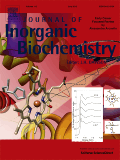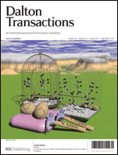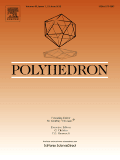
RUSSIAN JOURNAL OF COORDINATION CHEMISTRY
Scope & Guideline
Pioneering Research in Metal-Organic Relationships
Introduction
Aims and Scopes
- Synthesis and Characterization of Coordination Compounds:
The journal regularly publishes research on the synthesis and structural characterization of a wide variety of coordination compounds, emphasizing novel synthesis methods and the use of advanced analytical techniques. - Magnetic and Electronic Properties:
Research articles often explore the magnetic and electronic properties of coordination compounds, providing insights into their potential applications in materials science and technology. - Biological and Medicinal Applications:
The journal features studies that investigate the biological activity of coordination compounds, including their potential as pharmaceuticals or as catalysts in biochemical reactions. - Coordination Chemistry of Lanthanides and Actinides:
Significant focus on the coordination chemistry of lanthanides and actinides, exploring their unique properties and applications, particularly in luminescent materials and catalysis. - Development of Novel Ligands:
The journal encourages research that introduces new ligands, particularly those that can form stable complexes with metals, leading to innovative materials and applications.
Trending and Emerging
- Metal-Organic Frameworks (MOFs) and Coordination Polymers:
There is a growing trend in the synthesis and application of metal-organic frameworks and coordination polymers, particularly in areas such as gas storage, catalysis, and drug delivery. - Redox-Active Ligands:
Research focusing on the design and application of redox-active ligands is gaining traction, reflecting a broader interest in developing compounds with tunable electronic properties for use in energy storage and conversion. - Biocompatible and Therapeutic Coordination Compounds:
An increasing number of studies are dedicated to the development of biocompatible metal complexes for therapeutic applications, particularly in cancer treatment, showcasing the journal's alignment with contemporary biomedical research. - Interdisciplinary Applications:
There is a notable rise in interdisciplinary research that combines coordination chemistry with fields such as materials science, nanotechnology, and environmental science, indicating a shift towards broader applications of coordination compounds. - Sustainable and Green Chemistry Approaches:
Emerging themes include sustainable synthesis methods and the development of environmentally friendly coordination compounds, aligning with global trends towards sustainability in chemical research.
Declining or Waning
- Traditional Coordination Chemistry:
There has been a noticeable decline in publications focusing solely on traditional coordination complexes without novel applications or innovative ligand designs, as the field shifts towards more applied and interdisciplinary studies. - Inorganic Synthesis Techniques:
Research that emphasizes basic inorganic synthesis techniques without a strong connection to coordination chemistry applications is becoming less frequent, as the community moves towards more complex and applied methodologies. - Fundamental Studies of Known Complexes:
Papers that merely replicate or slightly modify known coordination compounds without substantial new insights or applications are appearing less frequently, reflecting a trend towards original and impactful research.
Similar Journals

CHINESE JOURNAL OF STRUCTURAL CHEMISTRY
Exploring Innovations in Molecular ArchitectureThe CHINESE JOURNAL OF STRUCTURAL CHEMISTRY, published by Elsevier, stands as a vital resource in the field of structural chemistry, notably contributing to the advancement of knowledge since its inception in 1996. With its ISSN 0254-5861 and E-ISSN 0254-5861, the journal has established a firm reputation, garnering a Q2 ranking in the 2023 Chemistry (miscellaneous) category, which highlights its influence in the academic community (rank #155/408, 62nd percentile in Scopus). This journal serves as an invaluable platform for researchers and professionals by disseminating high-quality research findings, theoretical studies, and applied methodologies that address both fundamental aspects and emerging trends in structural chemistry. With contributions from distinguished scholars, it aims to foster innovation and collaboration, while providing a space for novel discoveries in the field. Although it does not currently offer Open Access, its robust content continues to attract a diverse readership eager to engage with cutting-edge scientific developments.

CRYSTENGCOMM
Unveiling the science of crystals for a transformative tomorrow.CRYSTENGCOMM is a distinguished journal published by the Royal Society of Chemistry, dedicated to advancing the field of crystallization and crystal engineering. With its impact factor consistently among the top tier in its category, CRYSTENGCOMM serves as an essential platform for researchers, professionals, and students in Chemistry, Condensed Matter Physics, and Materials Science. The journal has successfully maintained its relevance and influence since its inception, showcasing pioneering research from 1999 to 2024, with a commendable Q2 ranking in the latest evaluations. This accessibility to crucial developments in crystallization facilitates knowledge transfer across disciplines and enhances collaboration within the scientific community. Although it operates under a subscription model, the journal remains committed to disseminating cutting-edge research and fostering innovation in the field. For more information or to submit your research, please visit the Royal Society of Chemistry's website.

JOURNAL OF INORGANIC BIOCHEMISTRY
Exploring the Nexus of Inorganic Chemistry and BiochemistryJOURNAL OF INORGANIC BIOCHEMISTRY, published by Elsevier Science Inc, is a pivotal journal dedicated to exploring the intricate intersections of biochemistry and inorganic chemistry. With an ISSN of 0162-0134 and an E-ISSN of 1873-3344, this esteemed journal has been a key resource since its inception in 1979, converging its insights through impactful research projections until 2024. Currently ranked #18 out of 79 in Inorganic Chemistry, placing it in the 77th percentile, and #144 out of 438 in Biochemistry, at the 67th percentile, the journal showcases a diverse array of studies that contribute significantly to understanding the roles of inorganic compounds in biological systems. Although it does not offer open access, the journal remains integral in fostering rigorous academic discourse among researchers and professionals keen on advancing the field. With a Category Quartile ranking of Q3 in Biochemistry and Q2 in Inorganic Chemistry, it serves as a critical platform for scholars aiming to disseminate cutting-edge findings and stimulate scholarly engagement in this dynamic area of study.

JOURNAL OF CHEMICAL RESEARCH
Cultivating Excellence in Chemical Scholarship.JOURNAL OF CHEMICAL RESEARCH, published by SAGE PUBLICATIONS LTD, serves as a pivotal platform for scholars and practitioners in the field of Chemistry. With its ISSN 1747-5198 and E-ISSN 2047-6507, this journal has established itself as a reliable source of innovative research since its inception in 2000. The journal's comprehensive scope encompasses various facets of chemical research, providing a broad spectrum of articles that foster scientific advancement and technological innovation. Ranked in the Q3 tier of miscellaneous chemistry journals in 2023, with a Scopus rank of #246 out of 408, it represents a solid outlet for emerging and established researchers alike. Although currently not an open-access journal, its rigorous peer-review process ensures that only high-quality studies are published, catering to the academic and professional community's demand for credible and impactful findings. Positioned in the vibrant research landscape of the United Kingdom, the JOURNAL OF CHEMICAL RESEARCH is dedicated to expanding the frontiers of chemical sciences and is an essential resource for anyone committed to advancing this dynamic field.

RUSSIAN JOURNAL OF INORGANIC CHEMISTRY
Pioneering Research in the World of InorganicsThe Russian Journal of Inorganic Chemistry is a distinguished publication that delves into the fundamental and applied aspects of inorganic chemistry. Published by MAIK Nauka/Interperiodica/Springer, this journal has established itself as a vital resource for researchers, professionals, and students alike, contributing significantly to the fields of Inorganic Chemistry, Materials Science, and Physical and Theoretical Chemistry. With an ISSN of 0036-0236 and an E-ISSN of 1531-8613, the journal is indexed for easy access and citation. Though the journal currently operates under a subscription model, its commitment to disseminating high-quality research and fostering scientific discourse remains steadfast. The journal has been maintaining a consistent record since its inception, and its positioning in the Q3 quartile across various chemistry categories in 2023 underscores its relevance in the academic community. As it continues through its converged years from 1996 to 2024, the Russian Journal of Inorganic Chemistry plays a pivotal role in enhancing the understanding and advancement of inorganic chemistry, making it an indispensable tool for anyone engaged in this dynamic field.

DALTON TRANSACTIONS
Pioneering Research in Inorganic ScienceDALTON TRANSACTIONS, published by the esteemed Royal Society of Chemistry, is a premier journal in the field of Inorganic Chemistry, recognized for its significant contributions to advancing research and scholarship since its inception in 2002. With an impressive Impact Factor and ranked in the Q1 category, it holds a notable position at Rank #21 out of 79 within its Scopus category, highlighting its reputation for excellence and influence in the scientific community. This journal provides a platform for disseminating high-quality research, reviews, and communications related to all aspects of inorganic chemistry, fostering collaboration and innovation among researchers, professionals, and students alike. Although it does not offer open access, its robust selection process and commitment to scholarly integrity ensure that published works are of the highest standard. For those passionate about inorganic chemistry, DALTON TRANSACTIONS serves as an essential resource, fostering a deeper understanding of the field and its applications.

JOURNAL OF CHEMICAL CRYSTALLOGRAPHY
Bridging disciplines through innovative research in crystallography.Welcome to the Journal of Chemical Crystallography, a prominent publication dedicated to the advancement of knowledge in the fields of chemical crystallography, general chemistry, and condensed matter physics. Published by Springer/Plenum Publishers, this journal provides a critical platform for researchers, professionals, and students to disseminate and access innovative research findings and methodologies from 1994 to 2024. With an ISSN of 1074-1542 and E-ISSN 1572-8854, the journal currently holds a Q4 quartile ranking in both Chemistry and Condensed Matter Physics, reflecting its broadening scope and niche significance within the scientific community. While it operates under a traditional access model, it endeavors to promote high-quality research that advances theoretical and practical aspects of crystallography, making it an essential resource for those involved in these dynamic disciplines. Join us as we explore the intricate world of chemical structures and their properties, bridging gaps between chemistry and physics.

POLYHEDRON
Bridging Theory and Practice in Chemical Research.POLYHEDRON is a prestigious academic journal published by Pergamon-Elsevier Science Ltd, specializing in the fields of Inorganic Chemistry, Materials Chemistry, and Physical and Theoretical Chemistry. With its ISSN 0277-5387 and E-ISSN 1873-3719, the journal has been a significant outlet for groundbreaking research since its inception in 1982 and continues to be influential for scholars and practitioners. As of 2023, it holds a Q3 quartile ranking across its categorization, underscoring its impact within the scientific community with respectable Scopus Rankings that place it in the top percentiles of relevant fields. Situated in the United Kingdom, POLYHEDRON aims to foster the exchange of innovative ideas and findings related to polyhedral molecules and structures, making it an essential resource for researchers seeking to expand their knowledge and contribute to these dynamic areas of study. While currently not an Open Access journal, it remains committed to advancing education and research by providing quality content that serves both academic and practical applications.

Chemistry-Switzerland
Fostering Collaboration in the Heart of ChemistryChemistry-Switzerland is an esteemed, fully Open Access journal published by MDPI, dedicated to advancing research in a broad spectrum of chemistry disciplines. Launched in 2019, the journal has established itself within the academic community, particularly as it spans critical areas such as inorganic and organic chemistry, as well as electrochemistry. Recognized for its contributions, it has achieved notable rankings, including Q2 status in Chemistry (miscellaneous) and Inorganic Chemistry, and Q3 standing in Electrochemistry and Organic Chemistry for 2023. With a commitment to disseminating high-quality research, Chemistry-Switzerland serves as an invaluable resource for researchers, professionals, and students aiming to share their discoveries with a global audience. Located in Basel, Switzerland, this journal facilitates seamless access to cutting-edge research, fostering innovation and collaboration within the vibrant field of chemistry. With this dynamic platform, the journal aims to continue its trajectory of growth and impact, inspiring the next generation of chemists.

JOURNAL OF STRUCTURAL CHEMISTRY
Illuminating the Path of Chemical Discovery Since 1960The JOURNAL OF STRUCTURAL CHEMISTRY, published by PLEIADES PUBLISHING INC, is a premier resource in the fields of Inorganic Chemistry, Materials Chemistry, and Physical and Theoretical Chemistry. Established in 1960, this journal has been providing a platform for groundbreaking research, facilitating the advancement of knowledge and innovation up to the year 2024. With an ISSN of 0022-4766 and an E-ISSN of 1573-8779, this journal strives to maintain high academic standards, as evidenced by its quartile rankings in 2023, where it ranks Q4 across various chemistry categories. While it currently does not offer open access, the journal's insightful articles are crucial for professionals and students seeking to enhance their understanding and expertise in structural chemistry. Subscribers can expect a comprehensive collection of peer-reviewed research, empirical findings, and theoretical discussions that contribute significantly to the scientific community. With its strong historical foundation and ongoing commitment to quality, the JOURNAL OF STRUCTURAL CHEMISTRY continues to be an essential resource for those passionate about the complexities of structural chemistry.